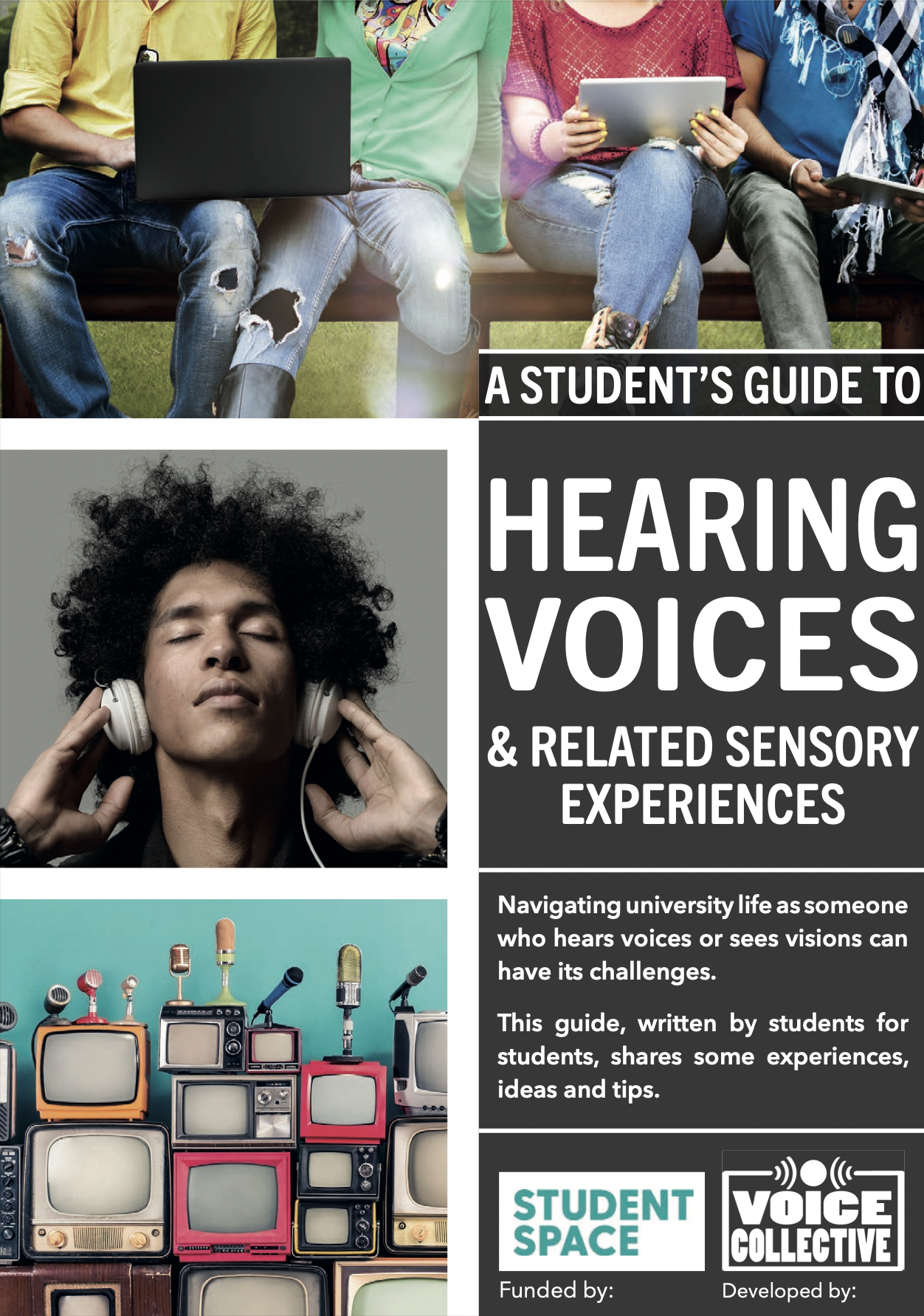Hearing voices while studying
Hearing voices when you’re at school, college or university can bring lots of different challenges.
Some voices can make it difficult to concentrate in class or lectures, absorb information while studying, or perform under the pressure of exams. Voices can sometimes be louder, more distracting or difficult in certain spaces, such as libraries, lecture halls or busy social areas. And some voices can make it hard for students to navigate the competing demands of tight deadlines, socialising, individual or group work.
If you’re leaving home for university for the first time, voices may be especially difficult.
Voices can become more overwhelming during periods of transition, times of high stress, sleeplessness, insecurity or financial difficulties.
If voices are critical or belittling, they can also undermine self-confidence, making it difficult for students to achieve their academic potential or causing them to postpone or discontinue their studies altogether.
On the positive side, some voice-hearers find their voices encourage them with their work, reassure them that they’re doing the best they can, and help them to make friends or work more effectively in groups. For example:
I sometimes recall stuff I am learning to the voices. They usually learn the stuff faster than I can and can occasionally throw me a hint.
Universities, schools and colleges have policies and procedures in place to support students who are struggling.
These range from informal emotional support to formalized options such as mentoring, counselling or psychotherapy, as well as a range of practical assistance or financial support. Some universities have also started Hearing Voices groups for students.
You can find out what is available in your institution by contacting student support services or your university counselling team.
Voice Collective have also produced some resources for students who hear voices, which you can access by clicking the image below.
Other useful resources
Other useful resources include:
How can teachers support children and young people who hear voices?
A short animation produced by Voice Collective and the Young Voices Study (University of Manchester) led by Dr Sarah Parry and Dr Filippo Varese.
Helping students who hear voices thrive at university
A staff guide to helping students who hear voices thrive at university. Produced by Voice Collective and funded by Student Space.
How do other people manage?
People use a variety of different strategies in order to cope with their experiences in the classroom or lecture theatre, while doing homework, essays or assignments and revising for exams.
These may include stress management techniques, choosing where to study carefully, talking back to the voices, drawing boundaries with them or ignoring them completely.
Here are some things other students have found useful:
I am in University, and my voices can sometimes believe that people around me are talking about me and planning to attack me. So when studying I do it in my bedroom and not the library, so I can focus and the voices relax.
When studying, I invite the more serious voice to contribute, but ask the others to wait until later on
I have used my phone to pretend I am talking to someone else when I’m in a busy place. When I was studying at college or in a lecture I would try focusing on items in the room around me, or try and write down what the lecturer was saying to help me concentrate.
My therapist encouraged me to talk back to them. Sometimes I questioned them, other times I told them to “shut up.” I also learnt to set boundaries and would ignore the voices when I was studying.
Your rights and reasonable adjustments
Under equality law, education providers have a duty to make changes to remove, or significantly reduce, the substantial disadvantage faced by people with disabilities.
These changes are known as reasonable adjustments.
When would I be entitled to reasonable adjustments?
The Equality Act 2010 defines a disability as a ‘physical or mental impairment’ that has a ‘substantial and long-term’ negative effect on a person’s ability to do everyday activities. ‘Substantial’ means that it is more than minor or trivial – e.g. it takes much longer to complete a daily task like getting ready for work. ‘Long-term’ means 12 months or more.
If your voices are making it difficult for you to manage daily activities, you’ve been struggling for at least a year, and have found yourself at a substantial disadvantage to your classmates, you may be entitled to reasonable adjustments.
What counts as ‘reasonable’?
What counts as ‘reasonable’ depends on several factors, such as the size of an organisation or institution.
Your employer or education provider will also need to consider how effective the change will be in avoiding or minimising your disadvantage, the practicality of different options, the cost and availability of financial support.
What kinds of reasonable adjustments are available?
Education providers are able to make a range of reasonable adjustments to support you at study, and what’s considered a reasonable adjustment depends on individual circumstances.
For example, your education provider may:
- Take a flexible approach to your attendance and/or punctuality
- Allow you to have extensions on deadlines, and/or extra time in exams
- Offer pastoral support, counselling and/or mentoring
- Provide additional support with practical issues, such as time management
- Provide computer equipment to enable you to study at home
- Provide you with a Dictaphone to record lectures
- Arrange for you to have a named contact you could approach for extra support when you need it
- Provide you with a quiet room when needed
It can be helpful to let your education provider know if you require any reasonable adjustments as early as possible, especially if you would like to make special arrangements for exams.
Most providers have a system in place to assess and document your needs – e.g. in Higher Education settings these are outlined in Learning Support Plans or Individual Learning Plans. These documents detail the support you’re likely to receive, and may be completed by a Disability Advisor, Learning Support Coordinator or other member of support staff. You can search for the contact details of disability advisers at colleges and universities across the UK here.
What if I don’t know what might be helpful?
Even if you’re not sure what kind of adjustments might be useful for you, your academic institution must still consider a range of different options.
How do you make a request?
You can make a request for reasonable adjustments in person, in conversation with your Disability Advisor or Learning Support Coordinator.
However, you may find it helpful to make your request in writing, and keep copies of any emails or letters outlining the different forms of support that you’ll receive.
What about the cost?
Education providers must cover the cost of any reasonable adjustments made.
Students may be entitled to Disabled Students’ Allowances (DSAs) on top of their other student finance. How much you could receive is dependent on need, not household income. For more information about DSAs, including how to apply, visit the Government website.
What if there is a failure to make reasonable adjustments?
It’s important to keep in mind that a failure to make reasonable adjustments counts as unlawful discrimination under the Equality Act 2010.
If you are considered to be a disabled student and you can show that your education provider has failed to make reasonable adjustments you may wish to consider taking action, i.e. by making a formal complaint. If you’re successful you may receive compensation, in addition to reasonable adjustments at work or study.
Challenging unlawful discrimination can be a very stressful, and sometimes costly, process, so it’s worth taking some time to consider your options and get support.
You can find out more about your rights, discrimination while studying and what you can do if you’ve been discriminated against by visiting the Equality and Human Rights Commission or Disability Rights UK websites, or calling the Equality Advisory and Support Service on 0808 800 0082 from 9am – 7pm Monday to Friday, or 10am – 2pm on Saturday.


